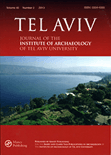
Tel Aviv-Journal of the Institute of Archaeology of Tel Aviv University
Scope & Guideline
Advancing Knowledge in the Heart of the Middle East
Introduction
Aims and Scopes
- Archaeological Excavations and Reports:
The journal regularly publishes detailed reports on archaeological excavations, providing insights into new findings, methodologies, and interpretations of material culture. - Material Culture and Artifact Analysis:
A significant focus is on the analysis of artifacts, including pottery, tools, and inscriptions, to understand the socio-economic and cultural contexts of ancient societies. - Chronology and Typology Studies:
Research often involves revising and establishing chronologies and typologies of various archaeological materials, contributing to a better understanding of regional developments over time. - Cultural and Religious Practices:
The journal explores the cultural and religious dimensions of ancient societies, including cultic practices and architectural developments, shedding light on their social structures. - Interdisciplinary Approaches:
Utilizing interdisciplinary methodologies, including archaeobotany, archaeometallurgy, and geoarchaeology, the journal highlights the integration of various scientific techniques in archaeological research.
Trending and Emerging
- Interdisciplinary Methods in Archaeology:
There is a growing trend towards the application of interdisciplinary approaches, such as archaeobotany and archaeometallurgy, enhancing the understanding of ancient societies through diverse scientific techniques. - Cultural Identity and Political Structures:
Recent studies increasingly focus on cultural identity and political organization in ancient societies, particularly in relation to royal estates and administrative practices, reflecting contemporary interests in socio-political dynamics. - Environmental Archaeology:
Research on environmental factors, including archaeobotanical remains and geoarchaeological contexts, is gaining traction, emphasizing the interaction between ancient communities and their environments. - Chronological Revisions of Key Sites:
There is a notable emphasis on revising the chronology of significant archaeological sites, particularly in Jerusalem and surrounding areas, which is crucial for understanding historical developments. - Cultic and Ritual Practices:
The study of cultic spaces and ritual practices in various periods, particularly the Middle Bronze Age, is emerging as a significant theme, reflecting interests in the spiritual lives of ancient peoples.
Declining or Waning
- Late Antiquity Studies:
Research focusing specifically on Late Antiquity has seen a decline, possibly due to a shift towards earlier periods and more foundational archaeological studies. - Roman Military Archaeology:
The exploration of Roman military sites and inscriptions, while still present, has become less frequent, indicating a potential waning interest in this specific aspect of archaeology. - Ceramic Typology of the Late Bronze Age:
Although ceramic studies remain vital, there appears to be a reduced emphasis on Late Bronze Age ceramics, with more focus shifting to Iron Age and earlier periods. - Anthropological Approaches to Archaeology:
There has been a decrease in anthropological perspectives applied to archaeological findings, which may suggest a trend towards more traditional archaeological methodologies. - Epigraphic Studies:
The frequency of studies focused exclusively on inscriptions and epigraphy has diminished, indicating a broader trend towards integrating epigraphic evidence with other archaeological data.
Similar Journals

JOURNAL OF EGYPTIAN ARCHAEOLOGY
Delving into the Legacy of Ancient CivilizationsJOURNAL OF EGYPTIAN ARCHAEOLOGY is a premier publication dedicated to advancing the study of ancient Egyptian culture, artifacts, and historical contexts. Published by SAGE PUBLICATIONS LTD in the United Kingdom, this journal has been an authoritative source of archaeological scholarship since its inception in 1964. It boasts an impressive reputation, currently holding a Q3 ranking in Archeology and Q2 rankings in both Archeology (arts and humanities) and History for 2023, underlining its importance in its field. With a focus on interdisciplinary research, the journal provides a platform for in-depth analysis and discussion among scholars, researchers, and students alike. The journal is also indexed in Scopus, with notable rankings that reflect its influence and reach within the academic community, especially among arts and humanities disciplines. Although it is not an Open Access publication, the insights offered through its meticulously curated articles are invaluable for anyone looking to deepen their understanding of Egyptology and archaeological practices. For scholars seeking to engage with contemporary discussions in this fascinating field, the JOURNAL OF EGYPTIAN ARCHAEOLOGY serves as an essential resource.
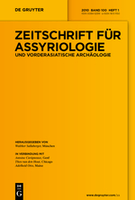
Zeitschrift fur Assyriologie und Vorderasiatische Archaologie
Exploring the Depths of Assyrian HeritageZeitschrift für Assyriologie und Vorderasiatische Archäologie, published by WALTER DE GRUYTER GMBH, is a distinguished journal in the field of archaeology, focusing on the rich histories of the ancient Near East and Assyrian studies. Established in 1886, this journal has a venerable tradition of contributing to scholarly discourse, continuously curating impactful research that positions it within the Q2 quartile in the domains of Archaeology and Arts and Humanities as of 2023. With an impressive ranking of #101 out of 413 in Arts and Humanities and #98 out of 354 in Social Sciences within Scopus, the journal serves as a vital resource for researchers, professionals, and students alike. Although it operates under a subscription model, the journal's extensive coverage—from its inception to the present day—ensures a comprehensive exploration of archaeological methodologies, discoveries, and theoretical frameworks. The journal's aim is to advance the understanding of the ancient civilizations of the Near East and to foster scholarly communication across international platforms, making it an essential venue for contemporary archaeological research.
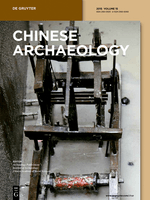
Chinese Archaeology
Fostering Knowledge of China's Archaeological TreasuresChinese Archaeology, published by WALTER DE GRUYTER GMBH, is a leading journal dedicated to the exploration and study of China's rich archaeological heritage. With an ISSN of 2160-5025 and an E-ISSN of 2160-5068, this journal serves as an essential platform for scholars, researchers, and enthusiasts in the field of archaeology, offering a blend of original research articles, reviews, and critical essays that address both contemporary issues and historical narratives. While it currently operates under a conventional access model, making cutting-edge research available to a select audience, it plays a crucial role in advancing knowledge about China's archaeological sites, artifacts, and past civilizations. Given the increasing interest in Eastern archaeology and its significance in a global context, Chinese Archaeology is positioned as a pivotal resource for understanding and interpreting the complexities of China’s historical evolution. Researchers and academics are encouraged to contribute and engage with this vital field of study to foster greater insights and innovations.

Conimbriga-Revista de Arqueologia
Fostering Collaboration in the World of Archaeological InquiryConimbriga-Revista de Arqueologia is a distinguished open-access journal dedicated to the field of archaeology, published by COIMBRA UNIVERSITY PRESS. Since its inception, the journal has fostered a vibrant intellectual community focused on the exploration and dissemination of archaeological research, particularly emphasizing studies relevant to the rich historical and cultural heritage of Portugal and beyond. With its open access model established in 2014, it has become a vital resource for researchers, professionals, and students to share their findings without access barriers, encouraging collaboration and knowledge exchange. Despite the absence of specific metrics such as the HIndex and Scopus rankings, the journal is recognized for its commitment to high-quality scholarship and its role in advancing archaeological discourse. Positioned within the scholarly landscape, Conimbriga-Revista de Arqueologia serves as a crucial platform for the publication of innovative research, reviews, and critical essays, making it an essential journal for those invested in the archaeological sciences.
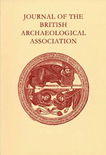
Journal of the British Archaeological Association
Preserving the Past, Inspiring Future DiscoveriesJournal of the British Archaeological Association is a prestigious publication in the field of archaeology, dedicated to fostering scholarly dialogue and advancing research related to Britain's rich archaeological heritage. Published by Routledge Journals, Taylor & Francis Ltd, this journal serves as a vital platform for researchers, professionals, and students alike, offering insights into archaeological practices and findings from the United Kingdom and beyond. With an ISSN of 0068-1288 and an E-ISSN of 1747-6704, the journal has a notable history spanning from 1980 to the present, contributing significantly to the academic community. Currently categorized within Quartile 4 for archaeology and visual arts, it serves as a resource for emerging researchers while promoting innovative perspectives in archaeology. Although it operates under a traditional subscription access model, the quality and depth of content delve into significant archaeological discussions, making it an essential read for those seeking to broaden their understanding of archaeological methodologies and theories. The association's commitment to preserving and interpreting archaeological data ensures that the Journal of the British Archaeological Association remains an indispensable resource for anyone passionate about uncovering the past.

Rossiiskaya Arkheologiya
Illuminating the Rich Tapestry of Human HeritageRossiiskaya Arkheologiya, published by IZDATELSTVO NAUKA, stands as a leading academic journal in the field of archaeology and history, renowned for its commitment to advancing scholarly discourse and research in these vital humanities disciplines. With an impressive Impact Factor and a distinguished position as a Q1 journal in both archaeology and history for 2023, it ranks among the top tier of academic publications, reinforcing its reputation within the scientific community. The journal features a diverse array of studies focusing on archaeological methodologies, historical analyses, and cultural heritage, fostering collaboration and knowledge exchange among researchers, professionals, and students alike. While access to its rich repository of insights is through a traditional subscription model, the journal’s contribution to the archaeological narrative not only elevates current research practices but also propels future inquiries within the Russian Federation and beyond. Addressing critical questions and dialogues within its scope from 2017 to 2023, Rossiiskaya Arkheologiya serves as an essential resource for anyone dedicated to exploring the complexities of human history through material culture.

Studijne Zvesti Archeologickeho Ustavu Slovenskej Akademie Vied
Bridging the past and present in archaeological studies.Studijne Zvesti Archeologickeho Ustavu Slovenskej Akademie Vied is a leading journal in the field of archaeology, published by the SLOVENSKA AKAD VIED, ARCHEOLOGICKY USTAV, based in Nitra, Slovakia. This esteemed journal, with the ISSN 0560-2793, has established itself as a vital resource for scholars and researchers, reflecting significant academic contributions in both the arts and humanities as well as social sciences. With a 2023 Scopus ranking placing it in the second quartile (Q2) for archaeology, it showcases rigorous research and innovative methodologies, essential for advancing archaeological studies. While it is not an Open Access journal, it continues to offer valuable insights into archaeological findings, theoretical frameworks, and interdisciplinary approaches. The journal serves as a bridge, connecting local Slovak archaeology with international discourse, making it an indispensable tool for students, professionals, and academics striving for a deeper understanding of the archaeological heritage of Slovakia and beyond.
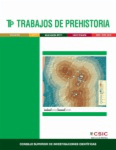
Trabajos de Prehistoria
Exploring the Depths of Prehistory: Where Research Meets DiscoveryTrabajos de Prehistoria is a distinguished peer-reviewed journal published by the Consejo Superior de Investigaciones Científicas (CSIC) since 1988, and it has established itself as a vital resource in the field of archaeology and prehistory. With an impressive impact factor and an open access policy, the journal aims to disseminate high-quality research that contributes to the understanding of human history and prehistorical studies. This Spanish journal has consistently ranked in the top quartile (Q1) in both the Arts and Humanities and Social Sciences categories, reflecting its significance in advancing archaeological scholarship, with Scopus rankings placing it in the 85th percentile among its peers. Covering a broad scope of topics related to archaeology, it serves as a platform for innovative research that connects researchers, professionals, and students globally, enhancing academic dialogue and fostering interdisciplinary collaboration. Based in Madrid, European researchers and global academics alike benefit from its open access model, promoting wider distribution and accessibility of foundational studies in the field.

Kratkie Soobshcheniya Instituta Arkheologii
Unveiling the Past, Shaping the FutureKratkie Soobshcheniya Instituta Arkheologii is a prestigious academic journal published by IZDATELSTVO NAUKA, specializing in the fields of archaeology and history. With an ISSN of 0130-2620, this journal has established itself as a vital resource for scholars, researchers, and students engaged in the humanities, particularly within the Russian Federation. Recognized for its high-quality contributions, it has achieved a remarkable Q1 ranking in both Archaeology and History for the year 2023, demonstrating its significant impact and relevance in these disciplines. Although it does not provide open access, the journal's robust positioning in Scopus — ranking #634 in History and #208 in Archaeology — further attests to its scholarly authority and the insightful research it disseminates. The journal covers a comprehensive range of topics, facilitating a deeper understanding of archaeological practices and historical methodologies, thereby fostering academic dialogue and knowledge advancement from 2018 through 2024. Addressing an international audience of professionals and students alike, Kratkie Soobshcheniya stands as a cornerstone for innovative research in archaeology and history.

Origini
Advancing Archaeological Insights and Innovations.Origini is a distinguished journal dedicated to the field of archaeology, published by EDIZIONI QUASAR S TOGNON SRL in Italy. With an ISSN of 0474-6805, it offers a platform for researchers and professionals to share their latest findings and insights. Having achieved a significant Q2 ranking in both Archaeology (Arts and Humanities) and Archaeology (Social Sciences) categories according to Scopus, it positions itself as a respected source of scholarly communication in the discipline. Over the converged years from 2017 to 2023, Origini has consistently aimed to advance archaeological research, fostering an environment where innovative theories and methodologies can be developed and discussed. Although it is not an Open Access journal, its contributions remain vital for academics and students seeking to deepen their understanding of archaeological practices and historical narratives. With a commitment to excellence, Origini stands as an essential resource within the archaeological community, inviting contributions that push the boundaries of knowledge and interpretation.